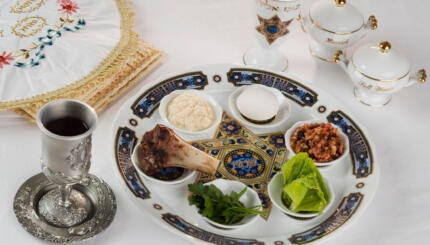April 2015 has been on my mind for a while. Since last September, to be exact, when I began counting the weeks to estimate a due date for my first child.
For the past several months,I have been reading the books, cleaning the house, painting the room, purchasing the gear, making checklists at work, all in anticipation for this impending April deadline. It wasn’t until last week as I was strolling through the grocery store past the matzah display that I realized I had left something off the to-do list: Passover.
As I cracked open one of those tiny bottles of Kedem grape juice (hey, it’s almost a satisfying treat after a long, dry, 8 months), I thought about our annual seder in Jackson, Mississippi, that I’ve come to love so much.
Every year, my husband and I host thirty-plus people, packed in our small home. It’s a special time of sharing my favorite traditions, enjoying the meal I spent two days preparing using old family recipes, sharing my Jewish culture with my mostly non-Jewish friends.
But this year… could we pull it off?
My husband breaking the middle matzahThree years ago my husband and I decided to forego hosting the event, seeing as it was so close to our wedding, but this year I’m feeling like it needs to be a priority. I’ve been getting a lot of great advice about parenthood, but one thing I can’t seem to swallow is when experienced parents give me that stern warning about how my life will never be the same. I really like the way life has been going so far; do I really have to give it all up? Thinking about Passover, and other Jewish holidays , I’m reminded that they serve as important touchstones throughout the year and how ritual and tradition helps focus and redirect a sometimes challenging or overwhelming time in our lives. They aren’t something having a child will take away – they are something I’ll want to share with the new addition to our family.
And so, seder is a go!
Sure, there’s going to be a third person living in my house soon, but right now it’s time to make the charoset. Sure, I’ve got to finish my spring semester assignments before I go into labor, but this is the time to read the story of Exodus in funny voices with my favorite friends. Sure, I’ve got piles of baby clothes to wash, but this is time to search for the afikomen (bonus if someone finds tiny socks during the process!).
I’ve tried to soften my stubborn habits during this pregnancy and as I entered my third trimester I began accepting my limitations. My body is working on a major project that needs special care and attention. But on the days when my mind starts racing about all the things I can’t do or the things that are about to change, I find comfort in the yearly traditions that won’t change. I don’t have to host the seder, but this year part of me really needs to. The Kedem grape juice doesn’t quite hit the spot as much as its Manischewitz cousin, but in the grocery aisle that day, the sugar provided just enough energy to throw some matzah in my cart and commit to making this a very pregnant Passover to remember, with maybe a few extra helpings of “matzah crack” for the mom to be!
Like this post?
Join the conversation through MyJewishLearning’s weekly blogs newsletter
.
afikomen
Pronounced: ah-fee-KOH-men, Origin: Greek, a piece of matzah that is hidden during the Passover seder, found after dinner and eaten as dessert at the end of the meal.
seder
Pronounced: SAY-der, Origin: Hebrew, literally "order"; usually used to describe the ceremonial meal and telling of the Passover story on the first two nights of Passover. (In Israel, Jews have a seder only on the first night of Passover.)



